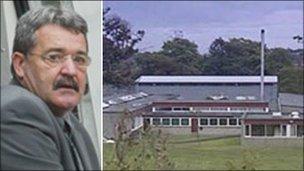Matthew George loses Kerelaw School abuse jail appeal
- Published

Matthew George physically and sexually assaulted pupils at Kerelaw School
A man who preyed on troubled children at the former Kerelaw School in North Ayrshire has lost an appeal to have his 10-year prison term reduced.
Former art teacher Matthew George was jailed in 2006 for a series of physical and sexual assaults at the school.
The 62-year-old complained that a nine-month wait for a decision to overturn his conviction was too long.
Appeal judges agreed his human rights had been breached but ruled that no reduction in sentence was required.
Kerelaw in Stevenston was closed in 2006 following a police probe into incidents of abuse.
Suspended and sacked
The residential school was originally run by Strathclyde Regional Council and its successor, Glasgow City Council.
Some of the pupils there had family problems which kept them away from home, some were truanting from school and others had been sent there for offences involving violence, theft or drugs.
George was suspended and later sacked from his position after the allegations against him first emerged.
His trial heard how George's victims were mostly boys aged about 14 or 15 and the offences dated back to 1978.
The jury heard he would boast about his own sexual exploits, expose himself to boys in the shower, demand oral sex and, on one occasion, attempt to sodomise one of his pupils.
He would also use pupils as guinea pigs to show off his martial arts skills, subjecting them to punches and slaps and painful wrestling holds, sometimes completely without provocation.
Guilty verdict
George was jailed for 10 years after the jury found him guilty of 18 charges of physical and sexual abuse against pupils.
The former teacher, from Largs, was later freed on bail to await the outcome of his appeal against conviction.
He was returned to prison in April after appeal judges rejected a claim that he had been the victim of a miscarriage of justice.
Following this, a second court date was set for the 62-year-old to appeal the length of his jail term.
He complained that a nine-month wait for a decision on his attempt to overturn his conviction was too long and breached his human rights.
Lord Reed, sitting with Lords Carloway and Wheatley, agreed the wait was excessive - but ruled that the public acknowledgement was enough and no reduction in sentence was required.
Sift evidence
The judges told George that he had been at liberty while waiting for an appeal decision and that it had taken him the best part of four years to prepare his case for the appeal court.
Lord Reed added that the nine months taken to sift through evidence and legal argument was too long.
He said: "That, I should make clear, does not reflect on the conscientiousness of members of the court but, rather, the extent to which the court was over-burdened at the time."
The appeal judges also rejected a plea to lessen the penalty because of minor changes to two assault charges resulting from his first appeal.
The amendments, said the judges, did not reduce the gravity of the other 16 charges.
- Published19 April 2011